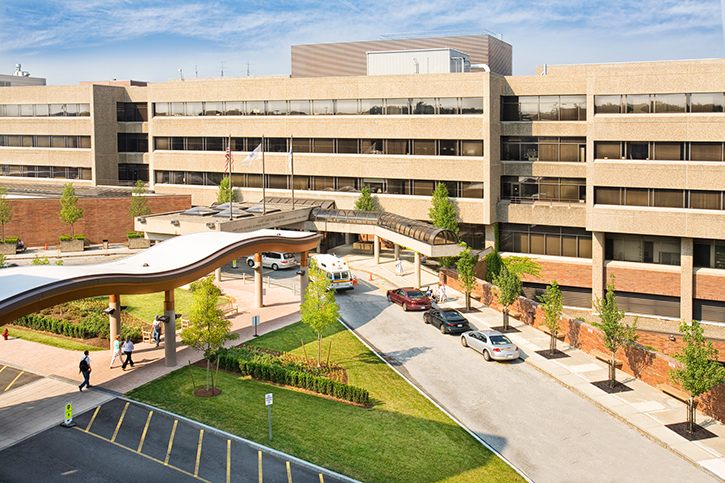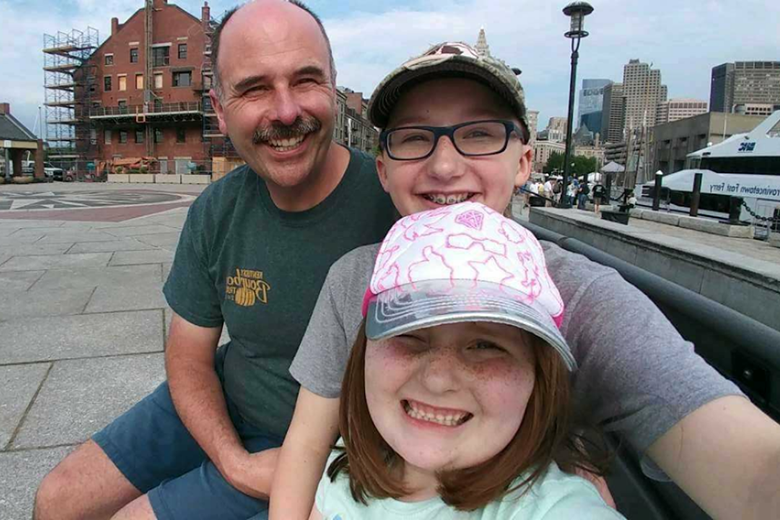Life-Saving Experience of Organ Donation
Organ donor Larry Lewis describes his meaningful experience donating a part of his liver to a four-year-old boy at Lahey Hospital & Medical Center.

At Lahey Hospital & Medical Center, we specialize in liver and kidney diseases and liver and kidney transplantation. We are the most experienced liver and kidney transplant team in New England, and our physicians use a collaborative approach that has resulted in some of the best outcomes in the country, according to the Scientific Registry of Transplant Recipients.
Patients are treated by a multidisciplinary team dedicated to liver transplantation and kidney transplantation. Our team performs live donor and deceased donor liver and kidney transplantations, including simultaneous liver and kidney transplants. Recognizing the shortage of available organs, we work to maximize the number of available livers and kidneys for transplant via living donor transplantation and paired exchange programs for incompatible donor-recipient pairs. All of our patients receive personalized care before, during and after a transplant. Our living donor liver transplantation program is the largest and most established in New England and one of the largest programs in the country.
Our surgeons have vast experience in surgery of the liver, pancreas and bile ducts, as well as shunt operations. We offer both minimally invasive and open approaches to surgeries of the liver, pancreas and bile ducts. We believe in the multidisciplinary management of portal hypertension, liver, pancreas and bile duct diseases, including cancer. We work closely with our gastroenterologists, hepatologists, nephrologists, oncologists and anesthesiologists to ensure the best outcomes for our patients.
Our transplant team is one of the most experienced and dedicated teams, and over the last decade, we have had a high transplant and low waitlist mortality rate.
There are two ways to make an appointment with our organ transplantation team at Lahey Hospital & Medical Center.
Your physician can contact our transplant team and request an appointment for you. Your referring physician will need to fax your records and mail images for our team to review before your appointment. Then, we will contact you to schedule an appointment.
You can call us directly to request an appointment. You will need to contact your primary care physician or other health care provider to get your medical records and images before scheduling an appointment. At the time of your initial call to the department, we will provide a specific list of medical records required for the appointment.
In either case, please contact your primary care physician to obtain the appropriate insurance referrals before your appointment.
We welcome referrals for organ transplantation at Lahey Hospital & Medical Center. We are the most experienced liver and kidney transplant team in New England, and the number-one live donor liver transplant program in the United States. You can feel confident that any patient you refer to Lahey will receive compassionate care by national leaders in transplant medicine.
Our fax number is 833-461-0694.
Transfer a patient: 617-278-7777, option 2

The first kidney transplant performed by Lahey surgeons was in 1974, and it was a live donor transplant between siblings. It was performed by members of the Department of Urology at the New England Deaconess Hospital, which served as Lahey’s primary in-patient facility at the time. The Urology group continued to perform living and deceased donor kidney transplants until the Lahey practice relocated to its current clinical facility in Burlington in 1978. Kidney transplantation became part of the department of transplantation in 2009. We have dedicated nephrologists within the department who are experienced of all aspects of the medical care of the transplant patients.
The liver transplant program also had its roots at the New England Deaconess Hospital, where on July 14, 1983, a team led by Dr. Roger Jenkins performed the first successful liver transplant in New England. It continued its tradition of innovative surgery by performing the first adult-to-adult live donor liver transplant in December 1998. In June of 1999, the entire liver transplant team, including surgeons, hepatologists, nursing and support staff, relocated to Lahey and continued their tradition of leadership in the field. In rapid succession, they added two additional “firsts” for the Department:
By 2008, Lahey’s live donor liver transplant program was the largest in the United States.
In January 2010, transplantation services at Lahey were united in a single department that contained liver and kidney transplant surgeons, hepatobiliary surgeons, transplant hepatologists and transplant nephrologists. This consolidation of transplant expertise in a single location provides our patients with seamless access to the specialists needed to successfully manage their care and allows for easy consultations between providers. The group’s successes continue today. It remains one of the largest U.S. centers for live donor liver transplants and is the most extensive liver transplant program in New England. We have performed over 1500 liver transplants since the inception of our program.
In 2017 we began our minimally invasive complex surgery program using robotic surgery. This is a comprehensive program available to selected patients who require surgery for a kidney transplant, living donor liver surgery or surgery for disorders of the liver, pancreas, bile duct and gallbladder. The goals of this program are to reduce post-operative pain and shorten the time needed for recovery.
In January 2019 we established the Roger L. Jenkins Transplant Institute, officially named for internationally renowned Lahey physician, Roger L. Jenkins, MD, a pioneer in liver biliary and pancreas surgery. Dr. Jenkins performed the first successful liver transplant in New England in 1983 and established the busiest and most successful transplant program here at Lahey. Dr. Jenkins continues to perform surgeries to this day.
At Lahey Hospital & Medical Center, we can help you learn more about organ transplantation.
Helpful resources include:
The American Liver Foundation is a national, voluntary nonprofit health agency dedicated to preventing, treating and curing hepatitis and all liver diseases through research, education and support groups.
This is an online community for living donors, potential donors, their families and the medical community.
The vision of the National Kidney Foundation is to enhance the lives of everyone living with, at risk for or affected by kidney disease.
The National Foundation for Transplant assists transplant candidates and recipients with the cost of transplant care when insurance or government programs do not cover all costs.
New England Donor Services coordinates organ donations through the New England Organ Bank (NEOB), which is the oldest independent organ bank in the country. It is the federally-designated organ procurement organization (OPO) for the New England states.
The Organ Procurement and Transplant Network (OPTN) maintains the only national patient waiting list and features the most comprehensive data available in any single field of medicine.
This organization provides transplantation and organ donation information and resources for transplant recipients, their families and donor families.
This site provides references and other information about transplantation and donation.
The UNOS site is dedicated to patients in need of transplants, as well as their families.
In the human body, the immune system is responsible for protecting us from foreign invaders such as germs, bacteria, or viruses. When you receive an organ transplant, the immune system similarly recognizes the new organ as foreign and may try to attack it. This process is called rejection, and to combat it, you’ll have to take several medications called immunosuppressants that suppress or lower the function of your immune system.
Your first dose of immunosuppression takes place at the time of your surgery, and these medications must be taken life-long. Some of the medications have side effects, so you may need to take additional medications to treat or prevent them. Lowering your immune defenses may also make you more vulnerable to infections or skin cancers compared to the general population. The transplant team will educate you on precautions you should take to protect yourself.
Our post-transplant nurse coordinator and our transplant pharmacist can help educate you on all aspects of your medication. They will provide you with a medication list that describes the medicines you need to take as well as their side effects, and the time, frequency and amount you should take of each.
Remember that after you leave the hospital, taking your medication correctly and at the same time every day is your responsibility. Taking your medication as directed by your doctor is essential to making sure your new organ remains healthy.
The Outreach Program is a professional health care service offered through the Division of Transplantation and Hepatobiliary Diseases to:
To request assistance from our outreach manager or to request a talk from one of our transplant hepatologists, transplant nephrologists, or hepatopancreatobiliary surgeons at a community or hospital-based meeting, please contact our outreach manager.
Jennie Cataldo
Outreach Program Manager
Email
781-744-2500

Organ donor Larry Lewis describes his meaningful experience donating a part of his liver to a four-year-old boy at Lahey Hospital & Medical Center.